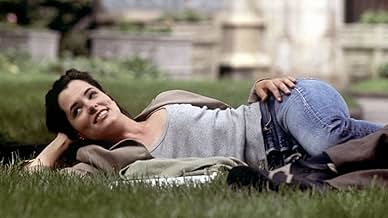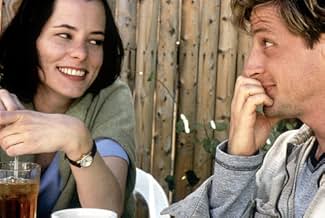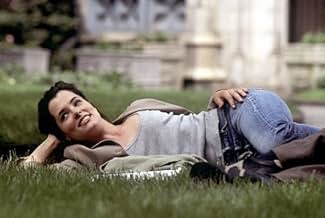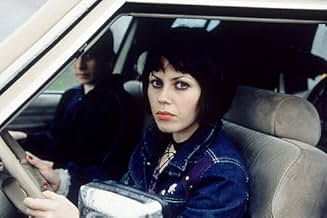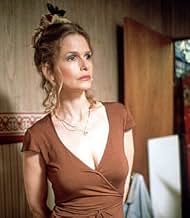Personal Velocity - Il momento giusto
Titolo originale: Personal Velocity: Three Portraits
VALUTAZIONE IMDb
6,4/10
4054
LA TUA VALUTAZIONE
Aggiungi una trama nella tua linguaThree women's escapes from their afflicted lives. Each struggles to flee from the men who confine their personal freedom.Three women's escapes from their afflicted lives. Each struggles to flee from the men who confine their personal freedom.Three women's escapes from their afflicted lives. Each struggles to flee from the men who confine their personal freedom.
- Premi
- 6 vittorie e 5 candidature totali
John Ventimiglia
- Narrator
- (voce)
Joel de la Fuente
- Thavi Matola
- (as Joel De La Fuente)
Recensioni in evidenza
I am hard-pressed to explain the praise heaped on this movie, and must sadly choose the obvious. This film would never have been touted as it has if it were made by someone other than Arthur Miller's daughter/Daniel Day Lewis's wife.
Of the film's three vignettes--domestic violence survivor, conflicted editor, and confused runaway--the second is most telling. Greta, the failure to her family, craves success and power in the literary world and only needs to have her innate talents recognized to do so. Her skill is "trimming the fat" from others' writing. However, Ms. Miller seems to have had no such attention paid to her own work. The incessant and intrusive voiceover dialogue, I assume taken directly from her collection of short stories, features pseudo-deep lines that made me literally laugh out loud.
In addition, I found many of the camera tricks and plot devices amateurish and the characters shallow and essentialized. I cannot recommend this film, which basks in its own specialness and its claims to gritty reality. Ms. Miller is a tourist in the lives of the struggling women she attempts to portray.
Of the film's three vignettes--domestic violence survivor, conflicted editor, and confused runaway--the second is most telling. Greta, the failure to her family, craves success and power in the literary world and only needs to have her innate talents recognized to do so. Her skill is "trimming the fat" from others' writing. However, Ms. Miller seems to have had no such attention paid to her own work. The incessant and intrusive voiceover dialogue, I assume taken directly from her collection of short stories, features pseudo-deep lines that made me literally laugh out loud.
In addition, I found many of the camera tricks and plot devices amateurish and the characters shallow and essentialized. I cannot recommend this film, which basks in its own specialness and its claims to gritty reality. Ms. Miller is a tourist in the lives of the struggling women she attempts to portray.
There's a point about an hour and twenty-five minutes into this film where the credits begin to roll. At this moment the viewer realizes "Personal Velocity" has come to a close. There's no plot to this film and, therefore, no ending. "PV" is a trio of vignettes, each about a young woman with some sort of sex/relationship crisis. Delia is the high school tramp turned battered housewife. Greta is a Jewish-American princess bored with her WASP husband. And Paula is a pregnant punker chick trying to mother a teen boy runaway who sucks his thumb. Yes, this is an arthouse project. It screams "We're an indie production! We can't afford light kits and tripods! We're all working for scale or for free! We made this film because we LOVE it!" In defense of Rebecca Miller: she wrote a book, adapted it for the screen, and cobbled together the funding and talent to turn it into a movie. Of course she has A-list family connections, but this is her own work. And it's a lot more than most of us could ever do. You go, girl! But unfortunately, it is a boring piece of work. The three lead characters are just plain dull and unsympathetic. It's hard to like them, and harder to identify with any of them. They've all made their own poor choices and now spend their screen time plotting an escape.
The male voice narration doesn't work. It's heavy-handed and annoying in a bad documentary way. Why can't the ladies narrate their own stories? What's wrong with Delia telling us in her own words how she spent most of high school entertaining the boys? Story line and characters aside, there's some potent acting here. Ms Miller enlisted top quality players Kyra Sedgwick, Parker Posey, and Fairuza Balk to perform the leads. Collectively, they are a knock-out. The supporting cast is spot-on. But you can only do so much with a one-note song. I really wanted to like this little movie. But I didn't.
The male voice narration doesn't work. It's heavy-handed and annoying in a bad documentary way. Why can't the ladies narrate their own stories? What's wrong with Delia telling us in her own words how she spent most of high school entertaining the boys? Story line and characters aside, there's some potent acting here. Ms Miller enlisted top quality players Kyra Sedgwick, Parker Posey, and Fairuza Balk to perform the leads. Collectively, they are a knock-out. The supporting cast is spot-on. But you can only do so much with a one-note song. I really wanted to like this little movie. But I didn't.
A critic I read before seeing this movie (Lynden Barber of the Sydney Morning Herald) opined that it was a book illustrated with film rather than a proper movie. He's right, but that does not make it a complete write-off. There is as much voice-over as in a football match (why use a male?) but the visuals still convey some of the stories, which are not all without interest.
There are three separate stories of women having trouble with men; two from the working class and one an upwardly mobile book editor. They are tenuously connected by a street incident. One has a bashing husband, another, a husband she has outgrown, and the third has problems with her boyfriend, her stepfather and her maternal instinct. All seem to favour running away as the solution; stand and fight is not the female way, at least not in New York State.
The author of the original short stories is Rebecca Miller, who also directed from her own screenplay. This certainly accounts for the literary quality. Rebecca has a famous literary father, the great Arthur Miller, and I suspect he is in the film somewhere as a character or at least a presence. The working class girl stories are too trite to be involving (though very well played by Kyra Sedgwick and Fairuza Balk) but the middle story of the book editor (played coolly by Parker Posey) rings true. The use of digital video suits the subject-matter (Dogma 95 on the Hudson) and the whole thing is competently realised. It is the weakness in the first and third stories that disappoints.
There are three separate stories of women having trouble with men; two from the working class and one an upwardly mobile book editor. They are tenuously connected by a street incident. One has a bashing husband, another, a husband she has outgrown, and the third has problems with her boyfriend, her stepfather and her maternal instinct. All seem to favour running away as the solution; stand and fight is not the female way, at least not in New York State.
The author of the original short stories is Rebecca Miller, who also directed from her own screenplay. This certainly accounts for the literary quality. Rebecca has a famous literary father, the great Arthur Miller, and I suspect he is in the film somewhere as a character or at least a presence. The working class girl stories are too trite to be involving (though very well played by Kyra Sedgwick and Fairuza Balk) but the middle story of the book editor (played coolly by Parker Posey) rings true. The use of digital video suits the subject-matter (Dogma 95 on the Hudson) and the whole thing is competently realised. It is the weakness in the first and third stories that disappoints.
I don't know why there are so many recent attempts at this sort of thing: individual episodes that approach and overlap the same concept. Perhaps it is because it is easier to craft episodes with power rather than worry about an arc of 90 minutes or more.
But we do have them. Some work amazingly well. I found 'Things you can tell' nearly lifealtering because of the crafty way all the actresses picked up each others' mannerisms to merge into the same woman. '!0 Conversations' was a different take, with the action all occurring in the same world. Less effective overall (with a more overt politics) but well structured.
This, however, is a mess. It bludgeons. It repeats. It insists on obviousness. No subtly is allowed: either an effect shouts or is bleached away. And the worst thing, the most damaging thing that can be said: there is no reward, no insight, no enrichment for the rawness we experience.
Wallace Shawn and a talented cinematographer wasted as well. Shame.
The reliable Parker Posey has a line so wonderful, so noticeably superior to all else, I am convinced she made it up: she says she needs to get an underwater camera.
Ted's Evaluation -- 1 of 4: You can find something better to do with this part of your life.
But we do have them. Some work amazingly well. I found 'Things you can tell' nearly lifealtering because of the crafty way all the actresses picked up each others' mannerisms to merge into the same woman. '!0 Conversations' was a different take, with the action all occurring in the same world. Less effective overall (with a more overt politics) but well structured.
This, however, is a mess. It bludgeons. It repeats. It insists on obviousness. No subtly is allowed: either an effect shouts or is bleached away. And the worst thing, the most damaging thing that can be said: there is no reward, no insight, no enrichment for the rawness we experience.
Wallace Shawn and a talented cinematographer wasted as well. Shame.
The reliable Parker Posey has a line so wonderful, so noticeably superior to all else, I am convinced she made it up: she says she needs to get an underwater camera.
Ted's Evaluation -- 1 of 4: You can find something better to do with this part of your life.
I saw this film tonight at the First Annual Tribeca Film Festival and understood its success at Sundance. In short, this film is about the awakening of three different women in very different lives and circle around a news report of a shooting in Manhattan and an ensuing car accident. With the telling of each woman's tale, Miller uses a brilliant 'degree of relation' to the accident in order to develop an engaging and powerful film.
Delia casually watches the news report of the accident while waiting for the cook to bring up her next order in a small-town diner in upstate New York. Though the audience does not see a particularly unusual response that she has to it, we can imagine that her difficult circumstances allow her to relate to it on a level of shared human suffering.
Greta, who's story is told in a series of flashbacks, watches it on the morning news minutes before she has her epiphany about her failing marriage and the new turn that her life is taking as a prominent editor for a large Manhattan publishing house. Because it is the only scene in her story that takes place in the present time, the audience is left to wonder what sort of pivotal role the news report has played in her epiphany.
Finally, Paula's story brings the accident close to home as she is a witness to it. Her epiphany was a direct result of the accident since it was a near-death experience for her. She's not only shocked from the impact of it, but her struggle to explain it with cosmic signs allows her to transcend the accident and the events following it.
The performances were real, the direction was brilliant, and the common thread that ran through the intimate details of the women's awakenings flowed easily, despite the segmented telling of their tales. Miller's work in this film has inspired me to seek out her feature debut, _Angela_ as well.
Delia casually watches the news report of the accident while waiting for the cook to bring up her next order in a small-town diner in upstate New York. Though the audience does not see a particularly unusual response that she has to it, we can imagine that her difficult circumstances allow her to relate to it on a level of shared human suffering.
Greta, who's story is told in a series of flashbacks, watches it on the morning news minutes before she has her epiphany about her failing marriage and the new turn that her life is taking as a prominent editor for a large Manhattan publishing house. Because it is the only scene in her story that takes place in the present time, the audience is left to wonder what sort of pivotal role the news report has played in her epiphany.
Finally, Paula's story brings the accident close to home as she is a witness to it. Her epiphany was a direct result of the accident since it was a near-death experience for her. She's not only shocked from the impact of it, but her struggle to explain it with cosmic signs allows her to transcend the accident and the events following it.
The performances were real, the direction was brilliant, and the common thread that ran through the intimate details of the women's awakenings flowed easily, despite the segmented telling of their tales. Miller's work in this film has inspired me to seek out her feature debut, _Angela_ as well.
Lo sapevi?
- QuizMaria Elena Ramirez's debut.
- Citazioni
Greta Herskowitz: How could he still love me? If he does, it's because he doesn't know me. I'm rotten with ambition, a lusty little troll, the kind of demon you'd find at the bottom floor of hell pulling fingernails off the loansharks.
- Curiosità sui creditiTo my mother
- ConnessioniFeatured in Personal Velocity: Creating 'Personal Velocity' (2003)
I più visti
Accedi per valutare e creare un elenco di titoli salvati per ottenere consigli personalizzati
- How long is Personal Velocity?Powered by Alexa
Dettagli
Botteghino
- Budget
- 125.000 USD (previsto)
- Lordo Stati Uniti e Canada
- 811.299 USD
- Fine settimana di apertura Stati Uniti e Canada
- 29.943 USD
- 24 nov 2002
- Lordo in tutto il mondo
- 890.502 USD
- Tempo di esecuzione
- 1h 26min(86 min)
- Colore
- Mix di suoni
- Proporzioni
- 1.85 : 1
Contribuisci a questa pagina
Suggerisci una modifica o aggiungi i contenuti mancanti


